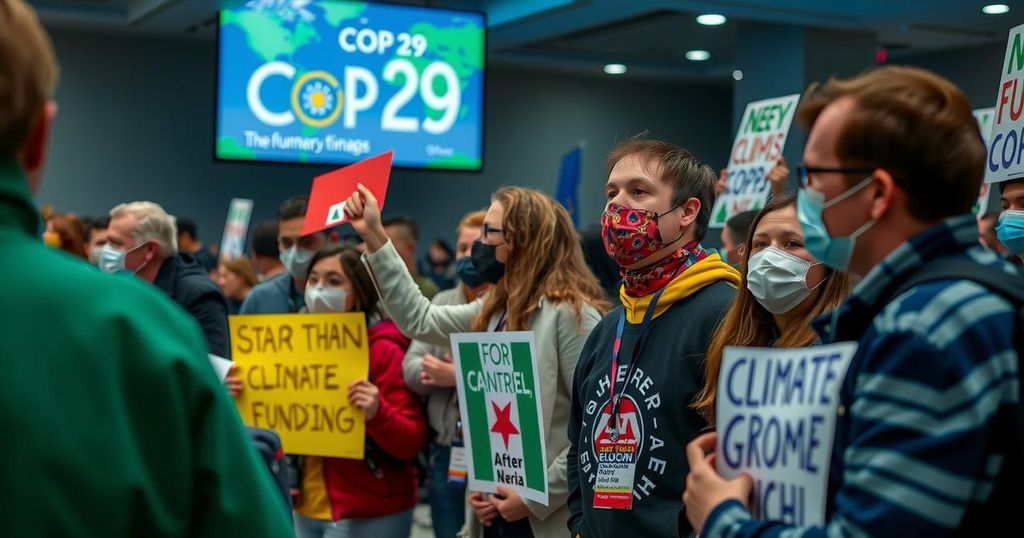Refugee activists at COP29 urged global leaders for increased funding and support to address the exacerbating challenges posed by climate change. A UNHCR report revealed a significant overlap between conflict and climate-induced displacement, highlighting the inadequate climate financing directed towards fragile regions. New coalitions like Refugees for Climate Action emerge to advocate for the voices of displaced individuals, emphasizing their necessity in climate discussions and planning.
At the COP29 summit in Azerbaijan, refugee activists delivered a poignant message to global leaders concerning the urgent need for enhanced funding and support for communities affected by the escalating climate crisis. Grace Dorong, a former refugee from South Sudan and founder of the NGO Root of Generations, emphasized that despite efforts to build better lives, climate change exacerbates their struggles, making survival increasingly daunting. She highlighted the precarious situation faced by those displaced by climate-related events and conflict, referring to it as a continual struggle against overwhelming dangers. A report jointly compiled by UNHCR and various experts revealed that approximately 75% of the 123 million people displaced by conflict are also severely affected by climate change. These individuals often inhabit regions prone to severe climate events, forcing them into a cycle of displacement with diminished prospects for returning home. UN High Commissioner for Refugees, Filippo Grandi, affirmed the gravity of their plight, stressing that what is discussed at the summit translates into real life challenges for vulnerable populations. Despite their vulnerability, refugees in fragile nations receive a starkly inadequate share of climate financing, with 90% being allocated to wealthier nations. Grandi labelled the disparity as a profound injustice and urged developmental actors to include these marginalized communities in their plans. In an encouraging development, UNHCR signed a Memorandum of Understanding with the Green Climate Fund, aiming to enable better access to climate resources for affected communities. During the discussions, young refugee activists, including Opira Bosco Okot from South Sudan, highlighted the necessity for support in capacity-building efforts to empower refugee-led initiatives. Okot co-founded the Refugees for Climate Action coalition, a new network advocating for the inclusion of displaced voices in climate decision-making. At the coalition’s launch, actor Theo James recounted his observations from a visit to refugees in Mauritania, pointing out that individuals escaping conflict are frequently confronted with devastating climate adversities, leading to a survival crisis. Activists like Okot and James have committed to ensuring that the experiences and needs of refugees are represented in climate dialogues, stressing the importance of advocating for climate justice and the rights of those displaced.
The COP29 summit in Azerbaijan provided a platform for addressing the critical intersection between climate change and forced displacement. With millions of individuals affected by conflicts and climate hazards around the globe, this issue has garnered significant attention as refugee communities call for stronger support and funding. The discussions highlighted the challenges faced by displaced people, who often find themselves in precarious situations exacerbated by environmental changes, leading to repeated displacements. The lack of adequate climate financing for fragile regions where many refugees reside complicates recovery and adaptation efforts, making the need for targeted funding and sustainable initiatives increasingly important.
In conclusion, the ongoing climate crisis poses serious threats to refugees and vulnerable populations, rendering the need for immediate support and funding paramount. As highlighted by Grace Dorong, Filippo Grandi, and other activists, addressing climate change impacts requires a concerted effort to include displaced communities in the discourse and decision-making processes related to climate financing. The establishment of networks like Refugees for Climate Action represents a vital step towards amplifying the voices of those most affected, advocating for justice and sustainable solutions.
Original Source: www.unhcr.org






